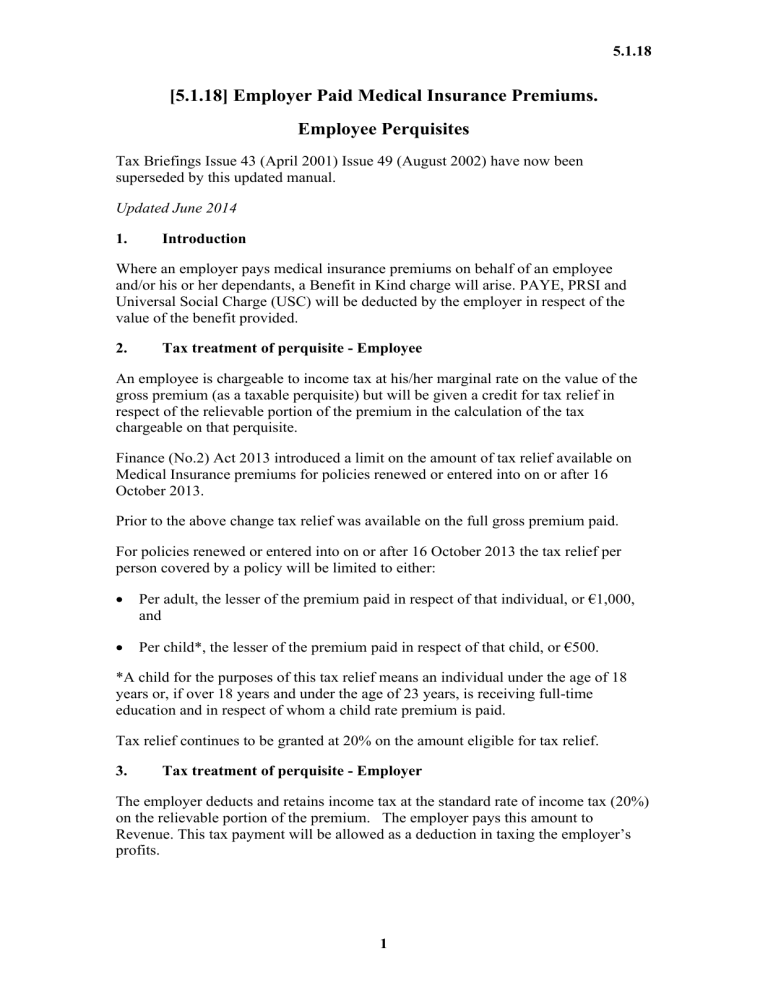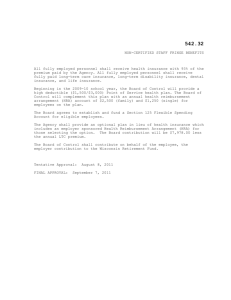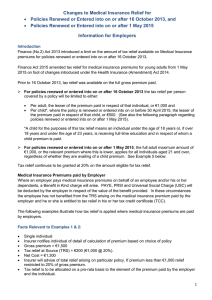Employer Paid Medical Insurance Premiums

5.1.18
[5.1.18] Employer Paid Medical Insurance Premiums.
Employee Perquisites
Tax Briefings Issue 43 (April 2001) Issue 49 (August 2002) have now been superseded by this updated manual.
Updated June 2014
1.
Introduction
Where an employer pays medical insurance premiums on behalf of an employee and/or his or her dependants, a Benefit in Kind charge will arise. PAYE, PRSI and
Universal Social Charge (USC) will be deducted by the employer in respect of the value of the benefit provided.
2.
Tax treatment of perquisite - Employee
An employee is chargeable to income tax at his/her marginal rate on the value of the gross premium (as a taxable perquisite) but will be given a credit for tax relief in respect of the relievable portion of the premium in the calculation of the tax chargeable on that perquisite.
Finance (No.2) Act 2013 introduced a limit on the amount of tax relief available on
Medical Insurance premiums for policies renewed or entered into on or after 16
October 2013.
Prior to the above change tax relief was available on the full gross premium paid.
For policies renewed or entered into on or after 16 October 2013 the tax relief per person covered by a policy will be limited to either:
Per adult, the lesser of the premium paid in respect of that individual, or €1,000, and
Per child*, the lesser of the premium paid in respect of that child, or €500.
*A child for the purposes of this tax relief means an individual under the age of 18 years or, if over 18 years and under the age of 23 years, is receiving full-time education and in respect of whom a child rate premium is paid.
Tax relief continues to be granted at 20% on the amount eligible for tax relief.
3.
Tax treatment of perquisite - Employer
The employer deducts and retains income tax at the standard rate of income tax (20%) on the relievable portion of the premium. The employer pays this amount to
Revenue. This tax payment will be allowed as a deduction in taxing the employer’s profits.
1
5.1.18
To ensure employees who are taxed on the BIK receive the appropriate tax credit, the
Form P35L includes a field to allow employers to notify Revenue of the amount of
‘Medical Insurance eligible for tax relief paid by Employer’.
Example:
An employee renews their policy on 1 January 2014. The employer pays the full premium as part of the employee’ s remuneration (i.e. perquisite). The details of the policy are as follows:
Gross premium paid by employer is €1,500
Tax relief related to employer share = €1,000 @ 20% = €200
Net payment to be made by employer to insurer will be €1,300
Employer pays €200 to the Collector-General
The tax position is:
Employer
The employer calculates the PAYE, PRSI and USC due on the gross premium of €1,500 and pays €200 to the Collector-General.
The employer returns €1,000 in the ‘Medical Insurance eligible for tax relief paid by Employer’ field on the end of year Form P35L.
Employee
The employee pays tax, PRSI and USC on the benefit received (€1,500). As he/she has not benefited from the Tax Relief at Source (TRS) arising on the portion of the premium paid by his/her employer, he/she is entitled to a tax credit of €200 (max €1,000 x 20%) in his/her tax credit certificate.
Revenue
TRS section in the Office of the Revenue Commissioners pays over the TRS of €200 to the insurance provider.
Further information is available at:
Medical Insurance Relief – Information for Employees
Medical Insurance Relief – Information for Employers
2









